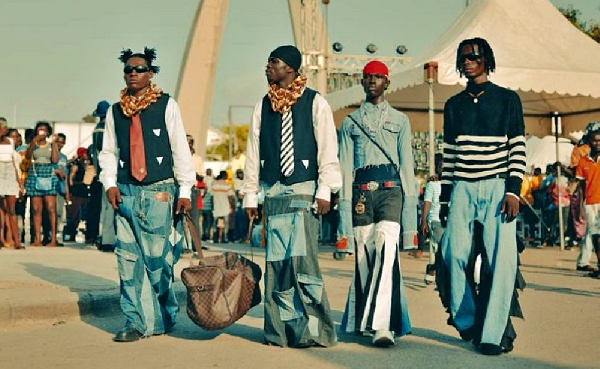On any given morning in Kantamanto Market, the heart of Accra’s second-hand fashion or clothing trade, the air is thick with the scent of damp fabric, dust, and urgency. Porters haul bales of clothing — called obroni wawu, or “dead white man’s clothes” — as traders slice open the plastic to reveal used jeans from Los Angeles, winter coats from Berlin, and T-shirts from Manchester emblazoned with slogans both ironic and unintelligible.
But beneath the chaos lies a finely tuned engine of commerce. Ghana’s second-hand clothing sector is no longer just a tale of cast-offs; it is a $200 million circular economy, employing an estimated 2.5 million people across logistics, retail, tailoring, dyeing, and even fashion design as reported by Accra Street Journal. From seamstresses refashioning hoodies into crop tops to vendors selling vintage Nike as premium streetwear, Ghana has turned waste into livelihood. And now, the sector faces its most formidable threat yet: global regulation.
From Dumping Ground to Design Hub
The scale of Ghana’s used clothing trade is staggering. According to OR Foundation, a nonprofit working in the sector, over 15 million garments arrive weekly at the Port of Tema, primarily from the U.S., UK, and Canada. While critics label this deluge as a form of e-waste colonialism—offloading unwearable junk onto the Global South—the reality on the ground is more nuanced.
“About 40% of the clothes we receive are usable, 30% are restyled or repurposed, and the rest ends up as waste,” says Grace Agyeman to Accra Street Journal, a third-generation trader at Kantamanto. “The trick is knowing what to pick, how to clean, and where to sell.”
That skill is what keeps Ghana’s informal economy humming. It’s also what birthed a new aesthetic now dubbed “E-Waste Chic”—a fusion of Afro-urban street style and western thrift, championed by Instagram stylists and Accra’s Gen Z fashion influencers. This isn’t just recycling; it’s reinvention.
Circular Economy or Circular Burden?
Globally, circular economy champions tout second-hand markets as sustainable solutions to fast fashion’s environmental toll. In that narrative, Ghana is a star actor—extending the life of garments, reducing emissions, and employing thousands. But local policymakers see a ticking time bomb.
“Our landfills are overburdened by textile waste,” warns Esi Appiah, director of environment at Ghana’s Ministry of Sanitation. “We burn or bury what cannot be reused. And that’s becoming a national hazard.”
Indeed, the Kantamanto waste problem is dire. Estimates show over 100 tonnes of unsellable clothing is dumped daily. Textile waste clogs drainage systems, exacerbates flooding in low-lying neighborhoods, and contributes to microplastic pollution in the Gulf of Guinea.
In response, Ghana is preparing to implement Extended Producer Responsibility (EPR) rules that would require exporting countries or brands to take financial responsibility for waste generated by their products. Similar legislation is already being discussed at the African Union level and piloted in Kenya and Rwanda.
Who Pays for Fashion’s Footprint?
The EPR proposal sounds logical—those who profit from overproduction should help pay for its cleanup. But in practice, critics say, it could collapse Ghana’s fragile second-hand ecosystem.
“If EPR is passed without consultation, we risk taxing out the people who rely on this trade for survival,” says Kwame Mensah, policy researcher at the Ghana Center for Circular Economy. “The cost of compliance will trickle down, not up.”
For example, if import tariffs or clean-up surcharges rise sharply, it could price out small traders, forcing them to either go underground or out of business. Already, some local importers say container costs have jumped 20% over the past year due to customs revisions and fuel price increases. Still, reform advocates insist the current system is unsustainable.
“The fashion waste crisis is real, and Ghana cannot keep being the dumping site,” says Liz Ricketts, co-founder of OR Foundation. “But instead of banning secondhand clothing, we should professionalize the industry, invest in recycling tech, and push for better global rules.”
Global Luxury, Local Hustle
Ironically, as Ghana debates how to regulate second-hand imports, Western fashion brands are borrowing from the exact aesthetic that Kantamanto has helped popularize. High-end designers now release collections that mimic distressed, mismatched, or upcycled clothing—what locals have worn out of necessity for years.
In other words, what the West discards, Ghana styles. That edge is not lost on Ghana’s emerging designers. Brands like Free The Youth and Daily Paper have drawn inspiration from secondhand trends, while boutique tailors now command international attention for creative upcycling. But without legal protections or economic recognition, the second-hand sector remains in the informal shadows—vital but vulnerable.
The Road Ahead
As Ghana weighs EPR and other reforms, the future of the second-hand clothing trade will rest on how policymakers balance regulation with livelihood protection. There are calls for an EPR model tailored to Ghana’s realities, one that reinvests revenues into local textile recycling, public education, and sustainable fashion entrepreneurship.
Until then, the traders at Kantamanto will continue their quiet revolution—turning fashion’s waste into one of Ghana’s most resilient economic pillars.
In a world drowning in fast fashion, Accra has learned to swim. The question is whether it can keep afloat once global tides change.
Accra Street Journal will continue to track how this hybrid sector evolves at the crossroads of waste, wealth, and wardrobe.


